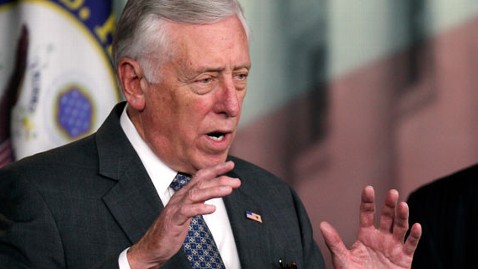Hoyer Calls on Congress to Replace Mandatory Cuts with 'Big Deal'

(Image Credit: Getty Images)
ABC News' John R. Parkinson and Carson McKinlay report:
House Minority Whip Steny Hoyer of Maryland this morning called on Congress to replace $1.2 trillion in automatic spending cuts mandated by law at the end of the year with a balanced package of deficit reduction akin to the grand bargain President Obama and House Speaker John Boehner negotiated unsuccessfully last summer.
Hoyer, the No. 2 ranked Democrat in the lower chamber, said the country's "deficits and debt present us with a clear and present challenge." He encouraged Congress to strike a deal before the November elections on a new structure of deficit reduction to replace cuts scheduled to take effect in the next decade, split evenly between defense and nondefense discretionary spending, as ordered by the Budget Control Act.
"Simply walking away from sequestration would be waving the white flag in the face of [the Congressional Budget Office's] projection of a dismal fiscal future. However, sequestration remains an irrational response. It was the blunt instrument established to force both sides to the table and keep them there.
"It is not a solution in itself," Hoyer told the think tank Third Way during an address on Capitol Hill this morning. "It should be replaced, but replaced only by the kind of big, balanced solution the Joint Select Committee was supposed to have produced."
Hoyer was part of about 100 lawmakers who signed onto a letter in the fall encouraging the Joint Select Committee on Deficit Reduction, also known as the " supercommittee," to enact deficit reduction through tax and entitlement overhaul. Hoyer said the same discussion continues to play out with many other congressmen who share that approach.
When the supercommittee failed to strike a deal, that triggered the mandatory sequestration cuts as a Plan B, but Congress wrote a cushion into the law, providing more than a year's time before the cuts are set to be implemented, and at the same time creating an opportunity to tweak the law.
"Revenue must be part, though not all, of a balanced solution to our debt," Hoyer, a 16-term representative, said. "A willingness to reach a comprehensive deficit reduction solution will also mean taking a serious look at the sustainability of our entitlements while ensuring that the most vulnerable among us are protected."
Democrats prefer to let tax cuts expire for individuals earning more than $250,000, and also support the "Buffet Rule," which would raise taxes on individuals making more than $1 million per year.
"All options must remain on the table," Hoyer urged. "There is no alternative, and we must do what's right for our country, even when it requires hard choices. We have a constitutional duty and a moral duty to the American people not to walk away."
A perfect storm of sorts might be brewing for a lame-duck session after the election with numerous measures set to expire at the end of the year, including the payroll-tax holiday, tax cuts for the wealthy and unemployment benefits. But Hoyer warned of the consequence of inaction, and said that Congress needs a better plan to reduce deficits before the economy will fully recover and should act before voters hit the polls.
"Our deficits and debt present us with a clear and present challenge. We must not wait for the next election, and we must not wait for things to get worse for our budget, for American businesses, and for American families," Hoyer said. "There is never a time when the next election is not looming before us - never a moment when we are free from the constraints of our politics. It is not going to get easier to reach an agreement. In fact, it will only get more difficult as time passes and our debt grows."
Third Way, a moderate think tank that works to foster "effective and emergent approaches to major problems," praised Hoyer for advocating a balanced approach and echoed the whip's concern about further congressional delay.
"There may never be a great time politically and in the election cycle to do a big deal. What we're doing right now is not working for our economy and it's not working," Jim Kessler, senior vice president for policy at Third Way, agreed. "Maybe it's a better time than we think."